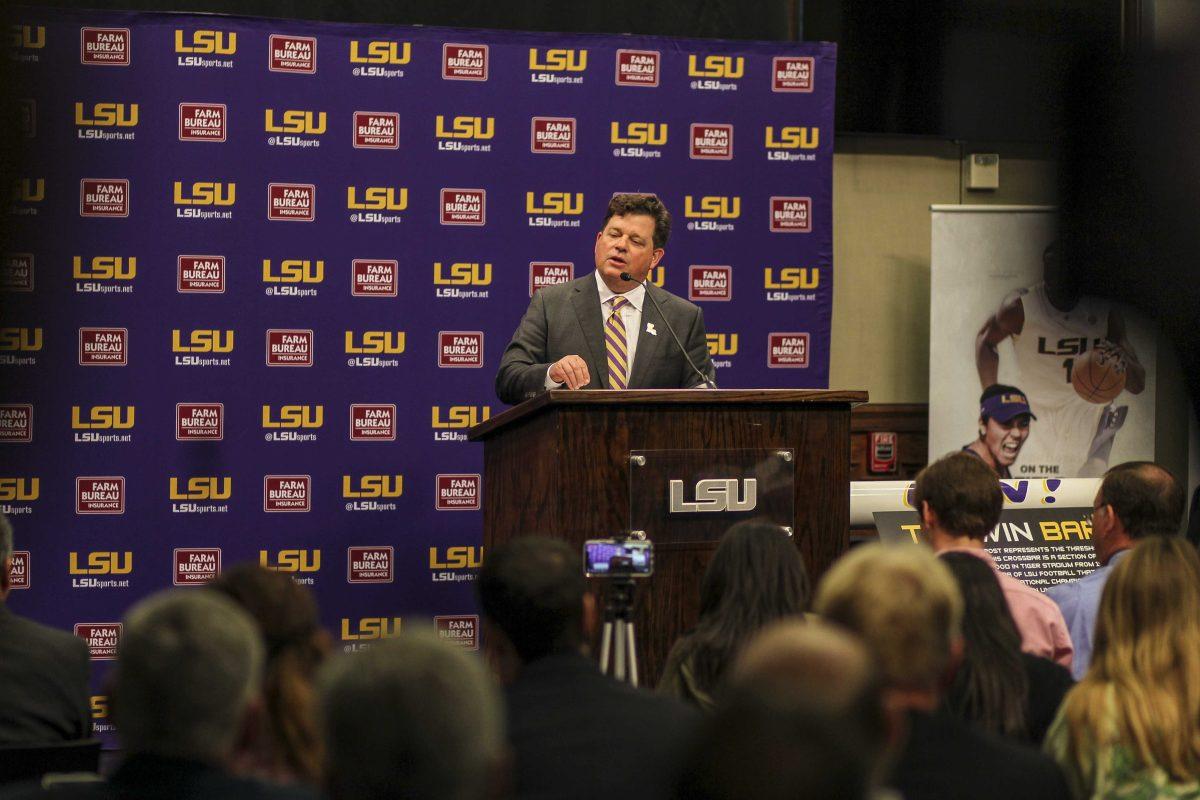Scott Woodward’s tenure as LSU’s athletic director began as a breath of fresh air. His presence marked a departure from the well-worn road of Joe Alleva’s 11-year tenure.
Woodward played up his Baton Rouge roots and took control of one of the nation’s most valuable athletic brands amid the turmoil of basketball coach Will Wade’s temporary suspension.
Woodward sported his best purple and gold tie along with a Louisiana suit pin. He had the credentials and the Louisiana roots. He seemed destined to finally push LSU past the vaunted rivals in Tuscaloosa.
The enthusiasm brought on by Woodward dissipated as the air grew thicker and spring turned to summer. Then, in late July, the new athletic director announced the re-evaluation of the seven-year old policy that transfers a portion of the athletic department’s surplus into the LSU General Fund. Meanwhile, the University faced a 3% budget shortfall.
Last week, Woodward went one step further. He said the transfer-fund policy would most likely end after the 2019-2020 academic school year.
Investing in University academics via the transfer-fund policy only stands to benefit Woodward’s athletic department. Being a well-funded, top tier research institution will aid in the recruiting process. An overwhelming majority of college athletes do not make a career out of sports. The student athletes themselves will benefit from stronger academics, renovated buildings and a new library when they leave the comfy confines of the Cox Auditorium.
LSU President F. King Alexander has remained quiet since Woodward’s announcement in July. Alexander used the opportunity to tout the Fierce for the Future campaign and to clarify that the campaign is not meant to devalue athletics.
“Athletics isn’t declining,” Alexander told The Advocate. “It’s staying about where it has been in the past. The only difference is the aggressiveness that we’re going out there with the campaign to raise money on the academic side to make up for the years that we perhaps should have been doing both.”
The conversation isn’t about athletics declining. It’s about growing academics and increasing investment in students. Alexander vacated an opportunity to defend the academic institution he represents.
The end of the transfer-fund policy does not signal the end of LSU’s financial troubles. It is short-term thinking that jeopardizes the University’s financial footing and is just another example of how the University’s principles are misguided.
Despite the budget shortfall, the University may be in its best financial situation in a decade, a testament to the poor state of higher education in Louisiana more than anything else. Enrollment numbers are up. The University welcomed its largest freshman class in school history, increasing tuition revenue.
The fall 2019 freshman class has 7,700 students, only two years after that number sat under 5,000. The Fierce for the Future campaign rolls on, reaching out to the LSU community for both athletic and academic donations.
The University’s financial situation is precarious at best, though. Increased enrollment supplements the loss of state appropriations. The state’s higher education budget was slashed by 60% during Bobby Jindal’s eight years in the Governor’s Office. Though the budget has not been cut under Gov. John Bel Edwards, state appropriations are only a shell of their pre-2008 levels.
University faculty did not receive a raise this year. Despite 3% merit raises in 2017 and 2018, faculty has received raises in only four out of the past eight years. With annual inflation at 2%, faculty essentially experience a pay cut in years without a raise.
Full-time instructional faculty earned an average of $85,021 in 2016, well below the national average of $95,521, according to a Southern Regional Education Board study. Merit raises aside, University instructors’ less-than-average earnings compromise the University’s ability to attract new faculty members.
As enrollment numbers increase, so will the need to hire more faculty. The hiring process itself is expensive, costing about $5,000 per person, with computer and equipment costs approaching an additional $7,000.
The University’s Campus Master Plan calls for the long overdue demolition of Middleton Library, along with Kirby Smith, McVoy and Broussard halls and the construction of new dorms. The plan is undoubtedly ambitious, but essential to the University’s plans to house all incoming students on campus.
The University cannot remain on such perilous financial grounds forever. Will it get thrown off balance, leading to another shortfall? What if state appropriations are cut under a new governor in 2020? What if the Louisiana economy slips into a recession and enrollment figures drop? Will the construction stop? Will the University forfeit the Campus Master Plan?
The slightest of political or economic changes in Louisiana could throw the University into financial chaos, much like in 2012 when the transfer-fund policy was implemented. If the University faced a budget shortfall this year with the largest freshman class in history on campus, what will happen if the University fails to annually exceed enrollment expectations?
The transfer-fund policy moves $7.2 million annually from the athletic department’s surplus into the LSU General Fund to be distributed throughout the academic institution. The $7.2 million is a pretty penny, and Woodward knows it.
In his press conference in July, where he first announced the policy would be re-evaluated, Woodward said the athletic department should be run like an “enterprise” and that the policy was “a poor way to run a University.”
Though Woodward offered a softer tone at the Rotary Club event, his comments in July cannot be undervalued. Woodward said the elimination of the transfer-fund policy will ensure the long-term success of his athletic department. The athletic department has a new beach volleyball stadium and a gymnastics training facility, not to mention the recently renovated $28 million football operations building. What more does the athletic department need?
Editorial Board: LSU’s misguided principles on display again with end of transfer-fund policy
September 4, 2019
LSU athletic director Scott Woodward holds an introductory press conference in the Journalism Building on Tuesday, April 23, 2019.








